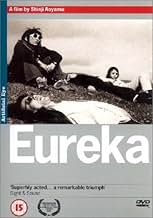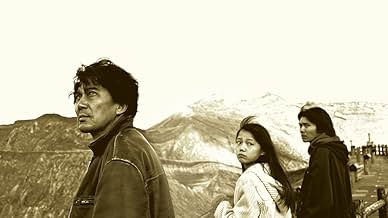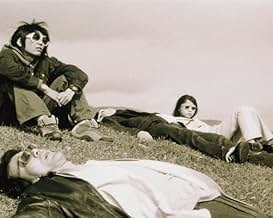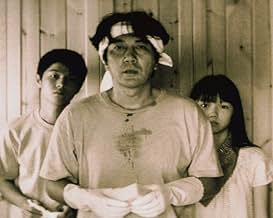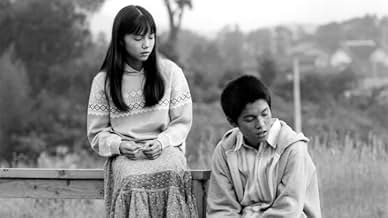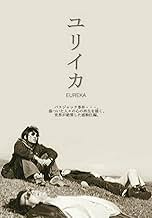IMDb-BEWERTUNG
7,7/10
4531
IHRE BEWERTUNG
Die traumatisierten Überlebenden einer mörderischen Busentführung kommen zusammen und machen einen Roadtrip, um zu versuchen, ihr beschädigtes Selbst zu überwinden. Währenddessen läuft ein S... Alles lesenDie traumatisierten Überlebenden einer mörderischen Busentführung kommen zusammen und machen einen Roadtrip, um zu versuchen, ihr beschädigtes Selbst zu überwinden. Währenddessen läuft ein Serienmörder frei herum.Die traumatisierten Überlebenden einer mörderischen Busentführung kommen zusammen und machen einen Roadtrip, um zu versuchen, ihr beschädigtes Selbst zu überwinden. Währenddessen läuft ein Serienmörder frei herum.
- Auszeichnungen
- 4 Gewinne & 2 Nominierungen insgesamt
Empfohlene Bewertungen
the first thing i heard about this movie was that it would be a 3.5 hours long black and white movie with a minimum of dialogues. that was all i needed to know to impatiently anticipate seeing Eureka. it took a while and it only showed in three cinema's here in belgium, in one cinema each month for they had only one copy of the film, so when i heard it played i found myself lucky to finally see it with a showing rate of once a day only five days/week. a bit surprised but then again could've guessed not a lot of people where in the (very)small theatre. as for most movies i anxiously await i held my breath, but this one captured me from the start. ok, better said: after the first scene is over you get involved with the three survivors of the bus-jacking, the driver and two kids - who never speak again from that day on and seem to live on their own (no one seems to know what ever happened to their parents... which is great, i love certain things that aren't explained in the movies,). but now i give away more than i like when writing about movies (this thing about the parents isn't even that important to the story, hence the give-away of this detail) *also, note that i saw this movie in september 2001 and never found it again to see or buy (if anyone has it and wants to get rid of it...)* the film is split up in three major parts. the first describes the fall and 'resurrection' of the driver, the second focusses on the children and how the three meet up again and try to bring their lives back into balance, the last part takes you on a final road trip through the country in a bus turned camper as a final solution type of thing. the last seconds hold a nice little surprise! (k, not a big o' deal - allthough it has this particular distinct meaning,wich i found quite amusing! -and will b lost for 99% of the viewers- the meaning that is) i know the duration was a turn of for a lot of people and i guess i can understand why most find Eureka boooring, but people like that never ever see these things in their whole perspective. if this movie were to've been made more up-tempo'd, it would've lost it's charm toootally. stories like these won't be told just that easily, it has to be absorbed in it's entirety, so one can feel every emotion intended, also gives you a bit time to think about things as you see them unfold instead of afterwords when you have to recollect the whole movie (which i did anyway but hey) this is a must-see-movie when being a moviejunk (especially the anti-hollywood-cinemaniacs) are u an emotional type? with eyes for beauty? see it.
Probably the only thing that has happened to me which i cannot express in words. Maybe thats what the director 'Shiniji' felt and instead of trying to express is it in heavy-Hollywood-dialogs syndrome, he chose the absolutely pinnacle and quintessential form of communication- ...... If you are looking for the definition of that art, you wouldn't just find,because it doesn't exist. You have to see this movie to venture into the world which is way beyond cinema and story-telling.
Each character has just defied the very fabric of artificial situations that are cinematic and have stepped into the horizons of real world much real that what we see now. Shiniji's brilliance is not only in the way he picked up the situation and silhouetted it with ever so beautiful backdrop but also in that fact that he hasn't compromised on the lines of letting the movie talk with its aura of silence. Many great directors would have been tempted to use the brilliant characters of Naoki and Kozue to speak up their frustration(a usual ploy in American and European Cinema) to reassure their directorial capabilities, but Shiniji's belief in the movie and its characters was much more intense than both his audience and himself.
Now a little about the movie. Eureka centrally addresses the condensed emotions of people who go through a catastrophe which might not be fatal physically but is absolutely draining mentally. The eventual darkness of body and mind that leads such people to imagine heinous crimes like murder without knowing the true essence of its legitimacy. It deals with complete disintegration of human psyche to unwanted darkness. But it also shows the inevitability of human victory of life and happiness over death and darkness. Eureka tours the human road-map of complete disillusionment and back to reclaim its lost grounds.
Naoki and Kozue though being kids display a true situation that can drive even kids to craziness. Though not being dumb, words have not been their respite. The killing emptiness within woven with their apathetic vocals drilled them to their core and they became immune to popular practice of existence. Talking and involving with others were a waste, for nothing in the world could bring them what they lost. And if you ask what they lost, they cant describe it, I cant describe it, and neither can Shiniji. We can only feel it.
Makoto together with the kids was also a subject to the catastrophe. It hit him so hard mentally that he lost himself to isolation. But he regrouped and returned to his home just to find that things have changed around him, he could not justify but accepted it because he could find himself a reason to it. He visits the kids and they form a small family in which no one has to say that they care for each other, they just have to feel.
I can go on for this movie for the rest of my life but if you are alive you will see it.
Each character has just defied the very fabric of artificial situations that are cinematic and have stepped into the horizons of real world much real that what we see now. Shiniji's brilliance is not only in the way he picked up the situation and silhouetted it with ever so beautiful backdrop but also in that fact that he hasn't compromised on the lines of letting the movie talk with its aura of silence. Many great directors would have been tempted to use the brilliant characters of Naoki and Kozue to speak up their frustration(a usual ploy in American and European Cinema) to reassure their directorial capabilities, but Shiniji's belief in the movie and its characters was much more intense than both his audience and himself.
Now a little about the movie. Eureka centrally addresses the condensed emotions of people who go through a catastrophe which might not be fatal physically but is absolutely draining mentally. The eventual darkness of body and mind that leads such people to imagine heinous crimes like murder without knowing the true essence of its legitimacy. It deals with complete disintegration of human psyche to unwanted darkness. But it also shows the inevitability of human victory of life and happiness over death and darkness. Eureka tours the human road-map of complete disillusionment and back to reclaim its lost grounds.
Naoki and Kozue though being kids display a true situation that can drive even kids to craziness. Though not being dumb, words have not been their respite. The killing emptiness within woven with their apathetic vocals drilled them to their core and they became immune to popular practice of existence. Talking and involving with others were a waste, for nothing in the world could bring them what they lost. And if you ask what they lost, they cant describe it, I cant describe it, and neither can Shiniji. We can only feel it.
Makoto together with the kids was also a subject to the catastrophe. It hit him so hard mentally that he lost himself to isolation. But he regrouped and returned to his home just to find that things have changed around him, he could not justify but accepted it because he could find himself a reason to it. He visits the kids and they form a small family in which no one has to say that they care for each other, they just have to feel.
I can go on for this movie for the rest of my life but if you are alive you will see it.
It has been almost 6 years since I saw this film, yet this film can stick with me and still offer me things.
After a tragic incident of violence, a bus driver tries to find two other teen-aged survivors, a brother and sister. The sparse black and white camera work provide an insight into the bleak emotional landscape as they just stumble through as "walking dead". Having lost a father, I can identify with the characters. What is touching is the lack of communication and dialogue between the actors (whic includes the lead of the Japanese "Shall We Dance" ). Yet there is love and communication made even by just the thumping on bus walls. Words fail them.
The camera work is bleak yet stunning in composition and texture. Minimal yet just enough to feel the principals trying to find meaning in life. One can also speak of the Japanese economic downturn and the resulting introspective dramatic films such as Hirokazu's "After Life". If have experienced grief or if you'd like to find some insight into it, this may be a film. It seemed shorter than the four hours, but you are forewarned.
After a tragic incident of violence, a bus driver tries to find two other teen-aged survivors, a brother and sister. The sparse black and white camera work provide an insight into the bleak emotional landscape as they just stumble through as "walking dead". Having lost a father, I can identify with the characters. What is touching is the lack of communication and dialogue between the actors (whic includes the lead of the Japanese "Shall We Dance" ). Yet there is love and communication made even by just the thumping on bus walls. Words fail them.
The camera work is bleak yet stunning in composition and texture. Minimal yet just enough to feel the principals trying to find meaning in life. One can also speak of the Japanese economic downturn and the resulting introspective dramatic films such as Hirokazu's "After Life". If have experienced grief or if you'd like to find some insight into it, this may be a film. It seemed shorter than the four hours, but you are forewarned.
Hailed as a masterpiece by some, and a near one by others, I liked it quite a bit, and never felt bored in spite of it's nearly 4 hour running time. I was quite moved – to the point of tears - by the end.
It looks and feels like no other movie I've seen, shot in a shifting sepia tone, with very little dialogue, and long silent takes. It's an intimate epic. Sort of a Japanese version of a Terrence Malick film.
A young brother and sister, and a bus driver are the only survivors of a random bus-jacking by a madman. The three retreat from the world. But two years later the bus driver seeks out the brother and sister – living alone and mute despite their youth – and the long, slow process of healing begins.
As much as I liked a lot of it, certain plot twists felt clunky or heavy handed, as did some of the dialogue. A movie so based in unspoken emotion loses something when the themes suddenly become too literal, in word or action. But, those are things that might bother me less on a second viewing, when I was more prepared for this unique, odd, challenging film.
It looks and feels like no other movie I've seen, shot in a shifting sepia tone, with very little dialogue, and long silent takes. It's an intimate epic. Sort of a Japanese version of a Terrence Malick film.
A young brother and sister, and a bus driver are the only survivors of a random bus-jacking by a madman. The three retreat from the world. But two years later the bus driver seeks out the brother and sister – living alone and mute despite their youth – and the long, slow process of healing begins.
As much as I liked a lot of it, certain plot twists felt clunky or heavy handed, as did some of the dialogue. A movie so based in unspoken emotion loses something when the themes suddenly become too literal, in word or action. But, those are things that might bother me less on a second viewing, when I was more prepared for this unique, odd, challenging film.
Some people have a disliking for Japanese cinema because the movies tend to be slow paced, minimalistic. If you're one of them - skip EUREKA is all you need to know. The movie moves along at a snail's pace on Sunday - at 90 minutes most movies are just coming to their explosive and or dramatic climax, but at that point I was still wondering what Eureka was about. 2 hours later the movie finally finishes - and I was still wondering what it was all about.
EUREKA is a movie of epic length, that raises other challenging questions like "Why is it 3.5 hours long?", "Why is it black and white?", "Is this all going somewhere?" and "Is it nearly finished yet?". Clearly director Shinji Aoyama wants his movie to make us think. And in 3.5 hours of black and white imagery and minimal dialogue, your mind certainly does have ample opportunity to wander.
Maybe I should have checked the "Director's Statement" that is included on the UK DVD before watching the movie. Then I'd have known what he was trying to say, and could have spent my time deciding if he said it effectively instead. Whether that would have been more fun or less I don't know though.
Not to say that I didn't enjoy watching EUREKA - for most of the run time I did. It's very well acted, has some good cinematography and is generally quite unusual. I'd have preferred it to have been shorter though, or had more going on - even colour photography would have helped to keep my attention on the screen with a little less effort.
I do think it's a good movie though, but... it just didn't need to be 3.5 hours to make its point or build its characters. Or maybe it did need 3.5 hours to do that, but Shinji Aoyama used his time badly - because at the end I still didn't really have a grasp on who the characters were 'deep down', or what the point of sharing their story with us was. Perhaps it's just that it's a movie aimed for better minds than mine to truly appreciate though. Certainly the length and style are going to keep any hopes of mainstream appreciation at bay.
EUREKA is a movie of epic length, that raises other challenging questions like "Why is it 3.5 hours long?", "Why is it black and white?", "Is this all going somewhere?" and "Is it nearly finished yet?". Clearly director Shinji Aoyama wants his movie to make us think. And in 3.5 hours of black and white imagery and minimal dialogue, your mind certainly does have ample opportunity to wander.
Maybe I should have checked the "Director's Statement" that is included on the UK DVD before watching the movie. Then I'd have known what he was trying to say, and could have spent my time deciding if he said it effectively instead. Whether that would have been more fun or less I don't know though.
Not to say that I didn't enjoy watching EUREKA - for most of the run time I did. It's very well acted, has some good cinematography and is generally quite unusual. I'd have preferred it to have been shorter though, or had more going on - even colour photography would have helped to keep my attention on the screen with a little less effort.
I do think it's a good movie though, but... it just didn't need to be 3.5 hours to make its point or build its characters. Or maybe it did need 3.5 hours to do that, but Shinji Aoyama used his time badly - because at the end I still didn't really have a grasp on who the characters were 'deep down', or what the point of sharing their story with us was. Perhaps it's just that it's a movie aimed for better minds than mine to truly appreciate though. Certainly the length and style are going to keep any hopes of mainstream appreciation at bay.
Wusstest du schon
- WissenswertesThe brother and sister in the film are played by real life brother and sister Aoi Miyazaki and Masaru Miyazaki.
- Zitate
Makoto Sawai: Do you think one can live only for others?
Top-Auswahl
Melde dich zum Bewerten an und greife auf die Watchlist für personalisierte Empfehlungen zu.
- How long is Eureka?Powered by Alexa
Details
Box Office
- Bruttoertrag in den USA und Kanada
- 49.388 $
- Weltweiter Bruttoertrag
- 49.388 $
- Laufzeit3 Stunden 37 Minuten
- Farbe
- Sound-Mix
- Seitenverhältnis
- 2.35 : 1
Zu dieser Seite beitragen
Bearbeitung vorschlagen oder fehlenden Inhalt hinzufügen


